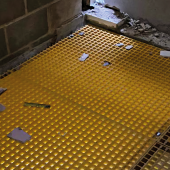Schools ordered to shut buildings made with aerated concrete

School buildings made from reinforced autoclaved aerated concrete (RAAC) could be unsafe or face closure, the schools minister has said.
Nick Gibb said "new evidence" emerged over the summer showing the dangers of reinforced autoclaved aerated concrete, known as RAAC.
Previously remediation was required when the RAAC was in critical condition, but Mr Gibb said the Department for Education (DfE) is now taking the "cautious approach" that all of the concrete should be removed.
He did not go into detail but later told BBC Radio Four's Today programme that a "beam collapsed" that had no external signs it was a "critical risk", prompting the change in guidance.
What is RAAC?
RAAC is a lightweight form of concrete. The Standing Committee on Structural Safety (SCOSS) has noted that: "Although called “concrete”, RAAC is very different from traditional concrete and, because of the way in which it was made, much weaker."
The lightweight material was used in public buildings, including the NHS Estate, from the 1950s up to the mid-1990s, but is now assessed to be at risk of collapse.
In the 1990s, several bodies recognised structural deficiencies in RAAC panels. It was recognised that the in-service performance was poor with cracking, excessive displacements and durability all being raised as concerns.
In December 2018, the Department for Education (DfE) and the Local Government Association (LGA) made building owners aware of a recent building component failure in a property constructed using RAAC. In May 2019, SCOSS raised an alert to emphasise the potential risks from such construction. Further information can be found in the RAAC Estates guidance. This guidance sets out the view of the DfE in relation to education settings. The Institute of Structural Engineers recommends a case-by-case approach, and so the DfE is assigning a case worker to each affected setting.
The DfE has since confirmed there have been a "small number of cases – including in education and non-education buildings – where RAAC has failed with no warning".
"Some of these cases are very recent," the DfE added.
Mr Gibb admitted to Sky News earlier today (Friday) that not all schools impacted by concrete safety fears have been contacted and it is not clear how many will have to shut fully.
The DfE has published further guidance for schools and colleges on identifying and managing RAAC, setting out how the department will provide support and capital funding to schools and other settings "so that face-to-face education continues safely".








